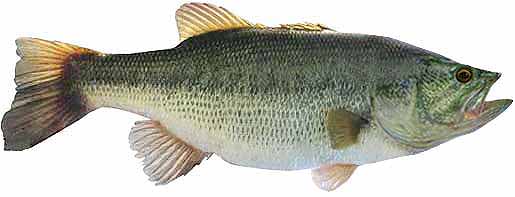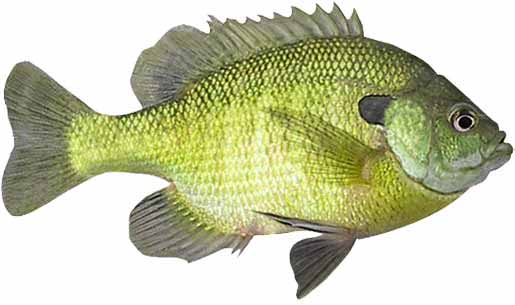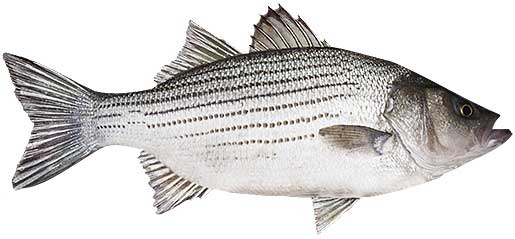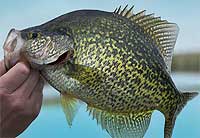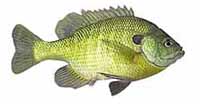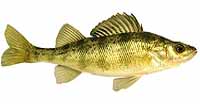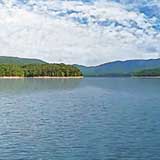Fishing Report For Carvins Cove Reservoir, VA
By Rick Seaman
Last updated on .
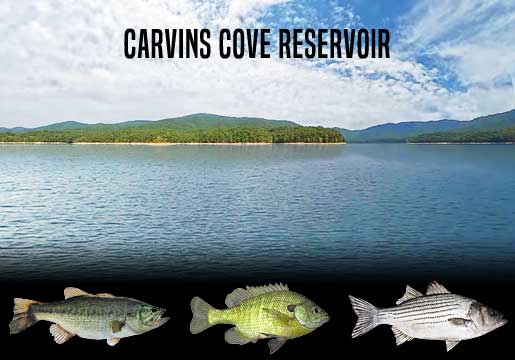
Fishing Reports
Popular Fish Species Carvins Cove Reservoir, VA
Fishing Report: Largemouth Bass
Current Fishing Report: Fair To Good
Bass fishing is currently experiencing major changes in the way anglers are approaching the sport. The expanded use of high-tech fish finders is giving anglers, who fish from a boat, a distinct advantage. The fishing hasn't really changed, but the catch rate has increased considerably. The advent of new lures and equipment has improved success for anglers fishing from the bank as well. Savvy anglers, who study bass patterns, continue to catch nice fish, with or without the new gadgets.
SUMMER. Water temperatures are in the low 80's, so summer patterns are in full swing. Bass are feeding shallow early and late in the day, where they are being caught on topwater, crankbaits and swimbaits. Wacky-rigged stick worms and Ned rigs are catching finicky bass when the bite is slow. Largemouth bass here feed on gizzard shad, small sunfish and crawfish. During the hotter parts of the day, they are being caught on points, channel edges, and ledges 15 to 25 feet deep, or deeper. The best reports seem to be from anglers fishing outside the corners of coves and pockets.
FALL. When Fall arrives, bass here will follow schools of baitfish into coves and shallow bays where spoons, swimbaits, and slow-rolled spinnerbaits have been successful in prior years. As deeper water cools, bait and bass move out to ledges, channel edges, points and humps where flutter spoons are often the ideal bait.
WINTER. Winter will isolate them around slightly deeper structure, flats, points and creek channels. They can be found from 20 to 40 feet deep. Here they hold, feeding less frequently, awaiting warmer water to return in Spring.
SPRING. Once water temperatures rise into the low 60's, largemouth will move from deep wintering holes, to shallower water just outside spawning areas. Jerkbaits, spinnerbaits and vibrating jigs typically get bites just away from the shoreline. At this time they are preparing for the spawn. Once water warms into the mid to high 60's, they will move into 1 to 4 feet of water, and create nests, then lay their eggs. Immediately afterwards, females move to deeper water and males remain to guard the eggs, and then the fry. After a couple weeks, the males also move to slightly deeper water. Crankbaits, vibrating jigs, plastic worms and swimbaits are catching bass during this period.
Fishing Report: Bluegill
Current Fishing Report:Fair To Good
Bluegill are a primary food source for predator fish here, and receive very little fishing pressure.
SUMMER. Following the spawn, most of the bigger bluegill migrate to deeper water, around 15 to 20 feet deep. They prefer rocky areas, often hanging out on steep, rocky banks where they can move up and down to feed without having to go a great distance. Small spoons, underspins, and small crankbaits are catching some of the bigger bluegill. Nightcrawlers are also catching decent numbers.
FALL. Cool, Fall weather drops the water temperature in the shallows and lures bluegill to move up along the shoreline. Steep banks and shallow areas with quick drop-offs are holding schools now.
WINTER. Cooling shallows will have driven the bluegill back to deeper structure with cover, in water ranging from 10 to 25 feet deep. In areas with no cover, anglers find them along points and humps with sharp drops into deeper water.
SPRING. In early Spring, bluegill migrate from deep winter holes toward the shore, and are typically caught around 5 to 10 feet deep. As the water warms to the mid 70's they will begin the spawning ritual, building nests in 1 to 3 feet of water. Many of the bigger bluegill prefer to spawn a bit deeper, depending on water clarity. Small spinners and swimbaits, or jigs tipped with small pieces of nightcrawlers are good choices for catching a lot of bluegill in spring.
Fishing Report: Hybrid Striped Bass
Current Fishing Report: Good
Hybrid striped bass here tend to run in sizeable schools. The use of new fish-locating electronics is helping anglers catch more hybrid stripers. Forward-facing, and side scanning, sonar is currently one of the the best ways to locate schools of both wipers and baitfish. It is particularly helpful in deep water. Once located, hybrid striped bass are being caught by trolling, casting or jigging, depending on depth.
SUMMER. In Summer, these wipers typically hang out in 20 to 35 feet of water, staying close to schools of bait. Sometimes during the heat of the day they move close to the bottom, 40 feet deep or deeper. Morning often draws hybrid stripers to much shallower water, so look for them around the 10-foot range as they feed on shallow, roaming schools of gizzard shad. Being successful at fishing for stripers in Summer success determined by the ability to locate schools of bait, and the wolf packs of wipers are likely to be nearby. Fish finders, and sonar electronics, are a big help. Nice wipers are being caught by casting, trolling or drift fishing. Spoons, blade baits, crankbaits, live bait and cut bait are all effective here.
FALL. In Fall, hybrid stripers return to the upper reaches of the lake, into inflowing water, if available. Look for deeper sections in the upper river channels, and fish them thoroughly. Most any lure that resembles shad will catch wipers at this time of year.
WINTER. In Winter, hybrid stripers again hang out in deeper water and feed close to the bottom, often 40 feet deep or deeper. Warm afternoons occasionally draw stripers shallower, so look for them around the 20-foot range as they feed on roaming schools of shad. In Winter, it is important to locate schools of bait, then look for wipers schooling below the bait. Fish finders, and forward facing sonar, are a big help in locating these roaming schools. Nice fish are being caught while trolling or drift fishing. Spoons, swimbaits, blade baits, crankbaits, live bait and cut bait are all effective this time of year. Due to slower metabolism, anglers are triggering more strikes by making slower presentations.
SPRING. When water temperatures rise into the mid 60's, it's the ideal time for the hybrid stripers to spawn. The state record wiper is over 15 pounds. The lake has plenty of hybrids averaging 2 to 5 pounds, with an occasional 8 pound fish being caught. In Spring, work the upper end of the lake, especially if there is inflowing water. If they spawn, this is where they will lay eggs in the flowing water. Look for deeper holes in the river channels, as they are a good holding place for hybrid stripers.
Lake & Fishing Video
Fishing tips for boat or bank fishing
Fish species to fish for...
Guide to fishing for largemouth bass, smallmouth bass, channel catfish, black crappie, bluegill, yellow perch and hybrid striped bass at Carvins Cove Reservoir in Virginia.
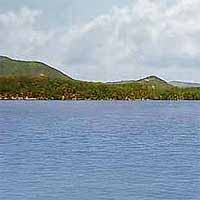
Carvins Cove Reservoir is a 630-acre lake with about 15 miles of shoreline. Largemouth bass, bluegill, hybrid striped bass, catfish, crappie, perch and smallmouth bass all reside here. Boat motors are restricted to 10 horsepower or less. There is some, limited access for fishing from the bank.
Primary fish species to catch
Click images for fishing tips and details about each species.
Today's Weather & Forecast
Fishing Boat Rentals
Click here for fishing boat rentals.
Public Boat Launch Ramps & Landings
Click here for boat ramps.
Fishing License
Click here for a Virginia Fishing License.
Map - Fishing & Camping Areas
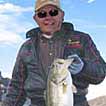
Rick Seaman is a fishing enthusiast with over five decades of fishing experience, a retired tournament fisherman, author of numerous published articles on fishing, and co-author of the book "Bass Fishing - It's not WHAT you throw, It's WHERE you throw it".
Contact Information
Carvins Cove Recreation Area
State Rte 648
Roanoke, VA 24019
540 362-1757
Fishing lakes in each state
010726
VIRGINIA


Fishing for largemouth bass, bluegill and hybrid striped bass in west-central VA.


